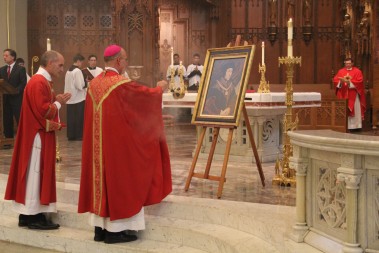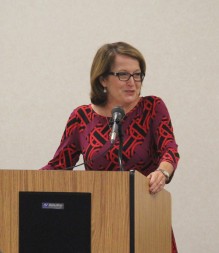October 14, 2015 // Local
Humility is first step in justice
Chief Justice Loretta Rush speaks at Red Mass dinner
By Tim Johnson

Bishop Kevin C. Rhoades celebrates the Red Mass at the Cathedral of the Immaculate Conception in Fort Wayne on Oct. 6. The Red Mass is celebrated in honor of the Holy Spirit, from whom flows the wisdom, understanding, counsel, patience, energy and courage necessary for the administration of justice. Those who work in the legal profession prayerfully seek these virtues, which are essential to the courtroom, law practice and public post.
FORT WAYNE — Lawyers, judges and civil government officials congregated at the Cathedral of the Immaculate Conception on Oct. 6 to participate in a Red Mass, an ancient tradition dating back to the 13th century that invokes God’s blessing on those who serve the law. Bishop Kevin C. Rhoades celebrated the Red Mass.
Following the Mass, Loretta H. Rush, the Chief Justice of the Indiana Supreme Court, was the featured guest and keynote speaker. Bishop Rhoades and the St. Thomas More Society of Fort Wayne hosted the annual event.
In his homily, which was published in the In Truth and Charity column in the Oct. 11 issue of Today’s Catholic, Bishop Rhoades recalled the witness of the patron saint of lawyers, judges, and statesmen — Sir Thomas More.
He recalled the words of St. Thomas More: “I die as the king’s loyal servant, but God’s servant first.” St. Thomas would not take the oath of supremacy ordered by King Henry VIII.
In her talk after the Red Mass, Chief Justice Rush also spoke of St. Thomas More as she based her theme on humility and justice.
“We are called to be more than legal practitioners” the Chief Justice summarized, “we are called to pursue and administer justice, but we need humility to get there. Humility to acknowledge our faults, to look outside ourselves to be the king’s good servants, but God’s first.”
In an earlier interview, Chief Justice Rush told Today’s Catholic, “When we recognize that we are imperfect at administering justice, we are implicitly acknowledging that there is such a thing as justice — that it’s real, that we didn’t create it. And that it’s something that’s judging us, instead of the other way around.”
“Ultimately, our fair and open courts are about one thing: Justice,” she added.
In her talk at the dinner in the Archbishop Noll Catholic Center, Chief Justice Rush said, “Justice is fundamentally a moral issue,” but added, “We know that justice and morality don’t always overlap.”

Indiana Supreme Court Chief Justice Loretta Rush speaks at the dinner following the Red Mass on Oct. 6.
She provided examples throughout U.S. history when enforcement of laws lacked justice — such as the Fugitive Slave Act and judges who did not provide equal justice to African Americans. “Justice is bigger than the human law that our legislators draft or what our legal opinions dictate,” she said.
The Chief Justice said the first step of understanding justice is humility. And from Proverbs, the fear of the Lord is the beginning of wisdom. “Similarly, humility is the beginning of true justice,” she said.
Chief Justice Rush spoke of King Solomon’s wisdom and how he received wisdom because he was humble. “Solomon’s example of humility should be our example of humility,” she said. “That is the beginning of understanding justice.”
She continued her talk explaining the relationship between humility and justice.
“First, humility acknowledges that we can get it wrong,” Rush said. “As judges and lawyers we are human, and sometimes we make mistakes.”
Even the highest courts are not exempt from that reality, she noted. “We have the tremendous potential to do great things for the people of Indiana. We also have tremendous potential to do great harm. Unfortunately, it’s not a question ‘if’ we’ll fall short, but ‘when,’” she noted.
“Admitting that we are imperfect allows us to begin moving towards true justice,” she said.
Her second point was humility provides an understanding that “justice is not something we invent, but something we receive.”
She said, “It’s our lack of humility that explains why so many theories of justice begin with ourselves — our freedom, our rights, our privileges and our liberties. If we start with ourselves, we forget where our freedoms, rights or liberties really came from. Humility allows us to look outside of ourselves to find justice. That is why the Bible has been the foundation of our legal system since the beginning.”
Justice, the Chief Justice noted, begins in the heart and mind of God under the rule and reign of Jesus Christ. For example, the founders of this nation believed that freedom of religion was not a product of Enlightenment, but of God Himself.
She said, “We protect life, because all are made in God’s image. We protect property because God is the source of all blessing and He has commanded, ‘Do not covet.’ And we enforce contracts because God is true and He keeps His promises. Governments have authority to enforce these rights and freedoms because the Lord, Jesus Christ has instituted government as His servant for good to His people. (Romans 13:7).”
Her third point was humility allows us to accept that human justice is never the ultimate, rather God’s judgment is the ultimate.
After providing examples from Maccabees and St. Thomas More, she said, “Even though human justice is not the ultimate, we still have a job to do. We must do good, we must do the good we know we need to do by recognizing our God-given role through constititions and (being) good servants, but God is first. Our understanding of the limits of justice is no basis to give up our Constitutional mandate, but rather keep in mind why justice should always be tempered with mercy.”
The call of justice goes beyond the courtrooms, she said, and into the communities. It includes services to families, the community and the vulnerable.
Chief Justice Rush is married to Deacon James Rush, who is assigned to St. Lawrence Church, Lafayette. The deacon assisted at the Fort Wayne Red Mass.
The best news. Delivered to your inbox.
Subscribe to our mailing list today.






